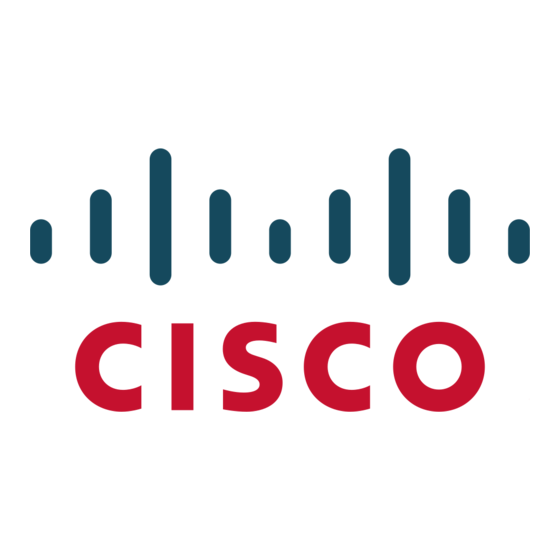Cisco 2960-24LT-L - Catalyst Switch Fiche technique - Page 8
Parcourez en ligne ou téléchargez le pdf Fiche technique pour {nom_de_la_catégorie} Cisco 2960-24LT-L - Catalyst Switch. Cisco 2960-24LT-L - Catalyst Switch 21 pages. Switching portfolio
Également pour Cisco 2960-24LT-L - Catalyst Switch : Fiche technique (11 pages), Brochure & Specs (10 pages), Fiche technique (28 pages), Description (1 pages)

© 2009 Cisco Systems, Inc. All rights reserved. This document is Cisco Public Information.
Manageability
● Cisco IOS Software CLI support provides a common user interface and command set with all
Superior Manageability
Cisco routers and Cisco Catalyst desktop switches.
● IP Service Level Agreement (responder only) uses active monitoring to generate traffic in a
continuous, reliable, and predictable manner, thus enabling the measurement of network
performance and health.
● Switching Database Manager templates for security and QoS allow administrators to easily
adjust memory allocation to the desired features based on deployment-specific requirements.
● VLAN trunks can be created from any port using standards-based 802.1q tagging.
● Up to 255 VLANs per switch and up to 128 spanning-tree instances per switch are supported.
● Four thousand VLAN IDs are supported.
● Voice VLAN simplifies telephony installations by keeping voice traffic on a separate VLAN for
easier administration and troubleshooting.
● Cisco VTP supports dynamic VLANs and dynamic trunk configuration across all switches.
● IGMPv3 snooping for IPv4 and MLD v1 and v2 Snooping for IPv6 provide fast client joins and
leaves of multicast streams and limits bandwidth-intensive video traffic to only the requestors.
● Remote SPAN (RSPAN) allows administrators to remotely monitor ports in a Layer 2 switch
network from any other switch in the same network.
● For enhanced traffic management, monitoring, and analysis, the Embedded Remote
Monitoring (RMON) software agent supports four RMON groups (history, statistics, alarms,
and events).
● Layer 2 trace route eases troubleshooting by identifying the physical path that a packet takes
from source to destination.
● All RMON groups are supported through a SPAN port, which permits traffic monitoring of a
single port, or a group of ports, from a single network analyzer or RMON probe.
● Domain Name System (DNS) provides IP address resolution with user-defined device names.
● Trivial File Transfer Protocol (TFTP) reduces the cost of administering software upgrades by
downloading from a centralized location.
● Network Timing Protocol (NTP) provides an accurate and consistent timestamp to all intranet
switches.
● Multifunction LEDs per port for port status; half-duplex and full-duplex mode; and 10BASE-T,
100BASE-TX, and 1000BASE-T indication as well as switch-level status LEDs for system,
and redundant power supply provide a comprehensive and convenient visual management
system.
● Cisco Discovery Protocol Versions 1 and 2 help enable automatic switch discovery for
network management tools and communicate Voice VLAN information with Cisco IP phones.
● Link Layer Discovery Protocol (LLDP) and LLDP Media Extensions (LLDP-MED) including
client location information. Switches exchange link and device information in multivendor
networks.
● IPv6 Host provides basic IPv6 management such as IPv4/IPv6 dual stack, unicast address
types, ICMPv6, AAAA DNS lookup over IPv4, Secure Shell (SSH) for v6, IPv6 neighbor
discovery, CDP, Telnet, TFTP, SNMP, HTTP, HTTPS , Traceroute, syslog for v6.
● Cisco Network Assistant is a no-charge, Windows-based application that simplifies the
Cisco Network Assistant
Software
administration of networks of up to 250 users. It supports a wide range of Cisco Catalyst
intelligent switches. With Cisco Network Assistant, users can manage Cisco Catalyst switches
and launch the device managers of Cisco integrated services routers and Cisco Aironet
WLAN access points.
● The easy-to-use graphical interface provides both a topology map and front-panel view of the
cluster and stacks.
● Configuration wizards need just a few user inputs to automatically configure the switch to
optimally handle different types of traffic: voice, video, multicast, and high-priority data.
● A security wizard is provided to restrict unauthorized access to applications, servers, and
networks.
● Upgrading the Cisco IOS Software on Cisco Catalyst switches is a simple matter of pointing
and clicking, with one-click upgrades.
● Cisco Network Assistant supports multilayer feature configurations such as routing protocols,
ACLs, and QoS parameters.
● Multidevice and multiport configuration capabilities allow administrators to save time by
configuring features across multiple switches and ports simultaneously.
● The user-personalized interface allows modification of polling intervals, table views, and other
settings.
● Alarm notification provides automated e-mail notification of network errors and alarm
thresholds.
● Express Setup simplifies initial configuration of a switch through a Web browser, eliminating
Cisco Express Setup
the need for terminal emulation programs and CLI knowledge.
● The Web interface helps less-skilled personnel quickly and simply set up switches, thereby
reducing the cost of deployment.
Data Sheet
®
Page 8 of 21
